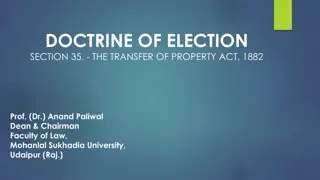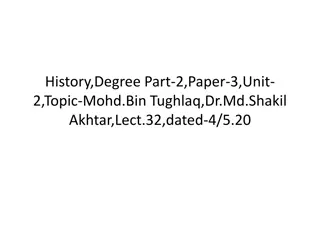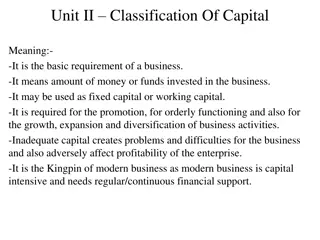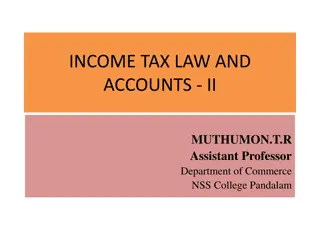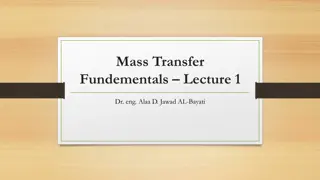Transfer of Capital by Muhammad bin Tughlaq - Controversial Decision
In 1327 A.D., Muhammad bin Tughlaq ordered the transfer of the capital from Delhi to Devagiri (Daultabad), a decision met with controversy. Factors such as strategic military considerations, administrative convenience, and personal dissatisfaction influenced this significant move. Ibn Batuta's account of the Sultan's frustration with Delhi's citizens adds another dimension to understanding the capital transfer. The event resonates as a pivotal moment in the history of the Tughlaq dynasty.
Download Presentation

Please find below an Image/Link to download the presentation.
The content on the website is provided AS IS for your information and personal use only. It may not be sold, licensed, or shared on other websites without obtaining consent from the author. Download presentation by click this link. If you encounter any issues during the download, it is possible that the publisher has removed the file from their server.
E N D
Presentation Transcript
History,DegreePart-2,paper-3, Unit- 2,Topic-Mohd.BinTughlaq,Dr,Md,Shakil AKHTAR,Lect.33,Dated-5/4/20
Transfer of the Capital: Transfer of the capital from Delhi to Devagari (Daultabad) has the most controversial step of Muhammad-bin-Tughlaq. Several factors prompted him to take this decision. Firstly Devagiri had been a base for the expansion of Turkish rule in India. It was not always possible to operate army from Delhi for the occupation of Southern states. Muhammad-bin-Tughlaq himself had spent a number of years as prince to occupy and guard the southern states during the time of his father.
Secondly as Devagiri was situated at a central place so the administration of the north and the south could be possible. He also did it in order to consolidate the newly conquered states of south. Thirdly Delhi was nearer to the North-Western frontier which was exposed to Mongol invasions. But Devagiri would be a safe place and almost free from Mongol raids.
Lastly, it was in the mind of the Muhammad-bin- Tughlaq that he would be able to utilize the vast wealth and resources of the south, if his capital would be there at Devagiri. But lb Batuta gives a different reason for this transfer of capital. According to him, Sultan Muhammad-bin- Tughlaq was disgusted with the life of Delhi because he was getting almost daily many anonymous letters from the people of the city abusing and criticizing him and therefore, he wanted to leave it for good.
Muhammad-bin-Tughlaq ordered for the transfer of capital in 1327 A.D. He ordered his courtiers, officers, leading men including Sufi saints as well as all people of Delhi to shift to Devgiri. According to Ibn Batuta A search was made and a blind man and a cripple man were found. The cripple man has put to death while the blind man was tied with the tail of horse and was dragged to Daulatabad where only his one leg reached.
Of course this version of Iban Batuta has been debatable. Batuta says, the citizens of Delhi used to write letters containing abuses and scandals to the Sultan. Therefore, the Sultan decided to lay Delhi waste in order to punish them. Sir Woolreley Haig has accepted the version of Ibn Batuta, Isami also says that the Sultan Muhammad-bin-Tughlaq resolved to break-up the power of the citizens of Delhi and therefore, decided to transfer the capital. Thus, he also supported the version of Iban Batuta.
But professor Habibullah and others have given almost the different views. The distance from Delhi to Daulatabad (Devagiri) was nearly 1500 km. The Sultan had set up rest houses on the way to help the travellers. There was a good deal of discontent.
After a couple of years, Muhammad Tughlaq decided to abandon Daulatabad because he realized the fact that just as he could not control the South from Delhi in the same way he could not control North from Daulatabad. He changed his mind and again in 1335 A.D. he ordered the retransfer of the Capital to Delhi and asked everybody to go back to Delhi.
Though the attempt to make Devagiri a capital failed, it had a long time benefit. It helped in bringing north and south closer together by improving communications. Many people, including religious divines who had gone to Daulatabad, settled down there. They became the means of spreading in the Deccan the cultural, religious and social ideas which the turks had brought with them to north India.
This resulted in a new process of cultural interaction between north and South India. However Muhammad-bin-Tughlaq has been criticized for this transfer of capital. Neither his selection of the place Devagiri as a site of capital nor his act of shifting the entire population of Delhi was welcomed by any historian. According to Standly Lane-poole, Daulatabad was a monument of misdirected energy.
https://www.historydiscussion.net/biography/ biography-of-muhammad-bin-tughluq-1325- 1351/3044/. Chandra, Satish: Medieval India: From Sultanat to the Mughals. New Delhi: Har- Anand Publications. 1997.









